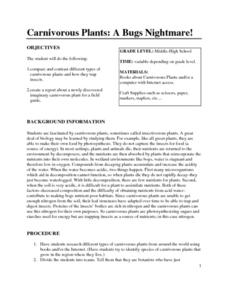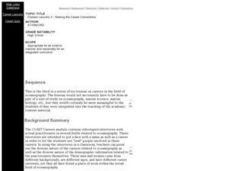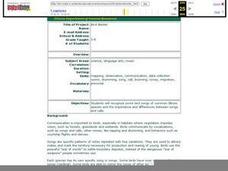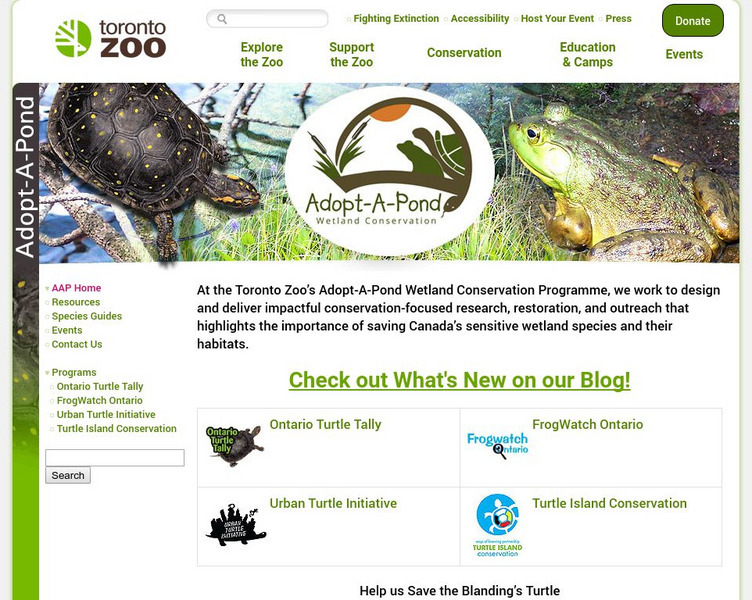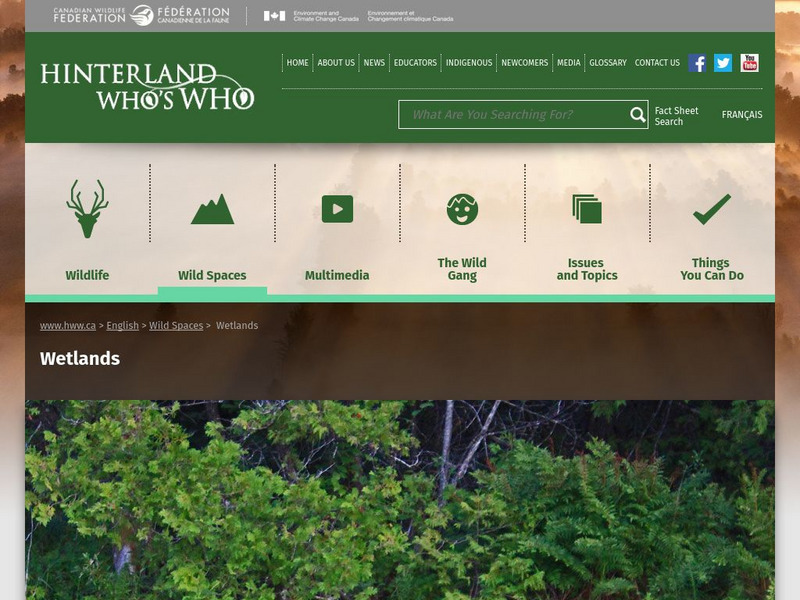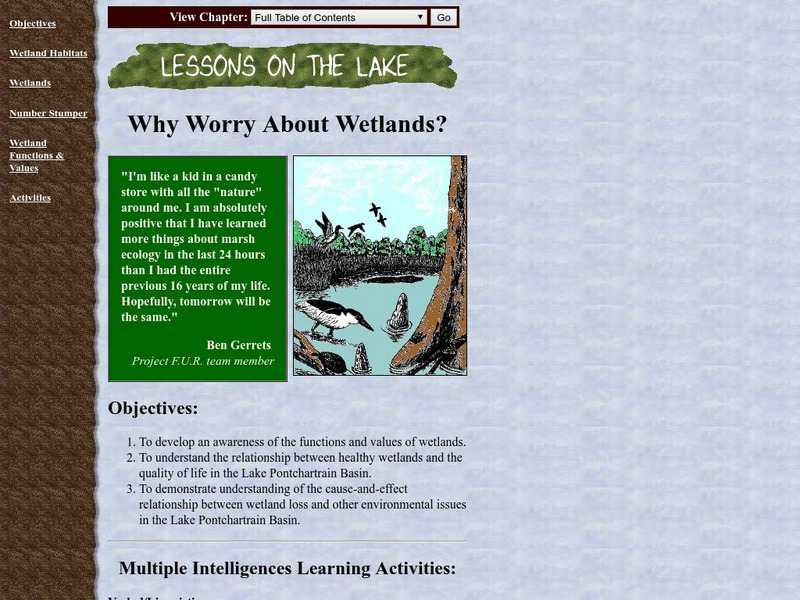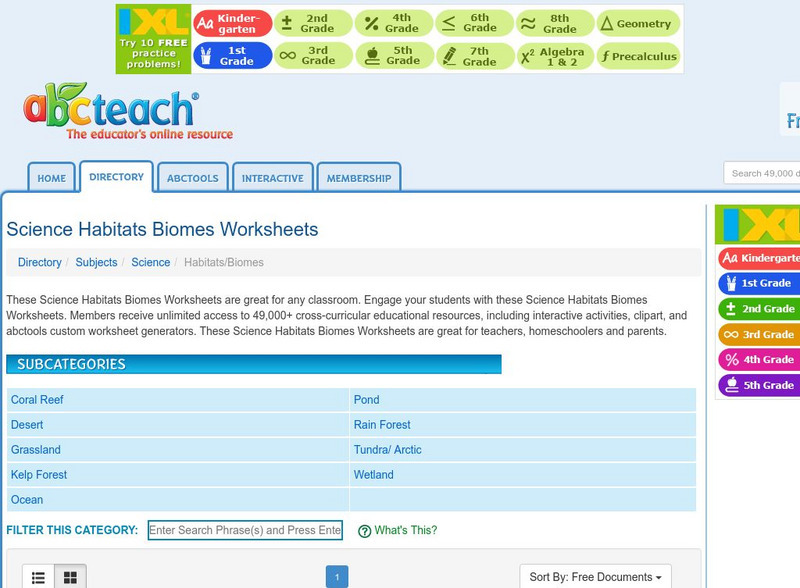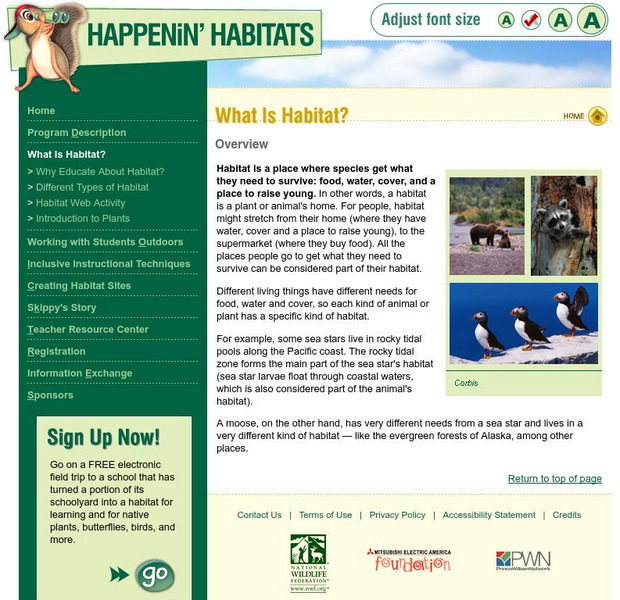Curated OER
Coastal Development
Students examine how a coastal area changes after it has been developed. They discover the impact of development on the environment. They illustrate their own non-developed area and change it into a developed area.
Curated OER
Birds of Wisconsin
First graders explore the job done by ornithologists. They role play identifying the characteristics that make a bird a bird. They discuss what makes each bird species unique. Students are introduced to Wisconsin's most common and rare...
Curated OER
Meadow Study
Students examine insects they collect in a sweep nets. They identify as many of the insects as they can.
Curated OER
Carnivorous Plants: A Bugs Nightmare!
Students research carnivorous plants and how they trap insects. They role play as botanists to write a research field guide about a newly discovered imaginary carnivorous plant.
Curated OER
Science: Making Career Connections
Students explore careers in oceanography. They compare and contrast requirements for careers in the field, and determine what high school courses would help to prepare them. Finally, they create a computer-based project related to...
Curated OER
Understanding Estuaries
Learners work together to develop their own estuarine ecosystem in an aquarium. They observe the aquarium daily and record them in a notebook. They discuss the different interactions they see with the class.
Curated OER
Bird Banter
Students listen to examples of common bird songs of birds found in Illinois. As a class, they discover the importance between the differences in songs and calls. They practice making their own bird calls and songs to end the lesson.
Curated OER
Mallard's Wet Olympics
Learners investigate some of the different characteristics of living things. They make observations from reading and interactive media. Students observe that animals move in different ways and have adaptations to aid in that action.
Curated OER
Roaming Biomes
Students use the Internet to research the capabilities of earth-observation satellites. Using the information, they write a report on how remote-sensing technology is used to measure the impact of climate change. They identify the...
Curated OER
Hide & Seek Butterflies
Students examine a variety of butterflies and discuss how they believe they get their color variations. In groups, they brainstorm the advantages and disadvantages of their color schemes. To end the lesson, they watch butterflies in...
American Institute of Biological Sciences
Action Bioscience: Loss of Wetlands: How Bird Communities Are Affected
With increased deforestation, invasive species, and other human actions harming or eliminating the wetland habitats the bird populations are decreasing. Scientists are working diligently to restore the wetland birds' habitats.
BBC
Bbc Nature: Wildlife: Wetlands
Take a close-up look at the world of wetlands and discover what lives and grows there through videos, pictures, news, descriptions, and external links. Listen to the various sounds that occur in wetlands.
Other
Toronto Zoo: Adopt a Pond Wetland Conservation Programme
This is a large website from the Toronto Zoo with information on environmental conservation. There are explanations about habitats and species, and teacher resources for a variety of grade levels and subjects.
World Wildlife Fund for Nature
Wwf: Our Earth: Ecoregions: Habitats: Freshwater Wetlands
An introduction and overview of freshwater wetland habitats.
Environmental Education for Kids
Eek!: Habitats: Wetlands
Wetland ecosystems are extremely valuable to wildlife, supporting a greater number of animals than any other type of habitat. Wetlands also absorb flood waters; filter chemicals, sediments, and other impurities out of drinking water;...
Canadian Wildlife Federation
Hinterland Who's Who: Wetlands
Learn about Canada?s wetlands, what they are and where they are located. Wetlands are divided into two classes: freshwater and saltwater. They are further separated into four main types: ponds, marshes, swamps, and peatbogs. Discover the...
US Geological Survey
Lake Pontchartrain Basin Foundation: Why Worry About Wetland?
Help students understand the functions and values of wetlands through these multiple intelligences learning activities. The site also includes information about the wetland habitats, commercial values, water quality, and erosion control.
A-Z Animals
A Z Animals: Reference: Habitats: Swamps and Wetlands
Learn about the plants, animals, and other characteristics of some wetland ecosystems.
abcteach
Abcteach: Habitats and Biomes
[Free Registration/Login Required] Find a variety of activities for children to do as they learn to identify varying habitats and biomes. Included are links to an even more extensive list of resources under coral reef, desert, grassland,...
Other
Galveston Bay Estuary Program: Habitat Restoration and Preservation
Describes the projects that have been undertaken in the Galveston Bay estuary region of Texas to restore and protect shoreline and wetlands habitats.
Other
National Wildlife Federation: Happenin' Habitats: What Is Habitat?
Find an overview of what a habitat is exactly. Then, for more information, click in the left hand menu for different types of habitat: forests, grasslands, deserts, wetlands, and arctic tundra. Authors also offer advice on creating a...
NOAA
Noaa: Ocean Facts on Marine Fish Habitats
The depletion of marine fish habitats from NOAA affects more than just the fish - it can affect you too! Learn facts about the importance of habitat preservation for science, and for people like you.
Utah Education Network
Uen: Trb 4:5 Investigation 1 Wetlands, Forests & Deserts
Learn about surface terrain and how plants and animals are affected by the temperatures and precipitation.
Other
Cartage: Salt Marsh Habitats
This resource provides a thorough examination of salt marshes and the grasses, plant species, and animal species that inhabit these areas.





